Nuclear Engineering Career Guide
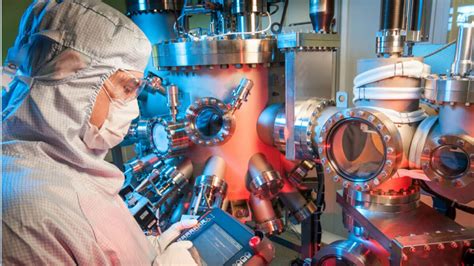
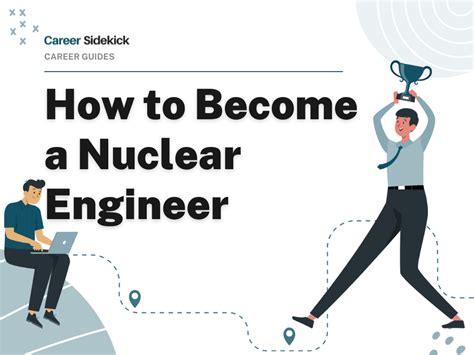
Introduction to Nuclear Engineering
Nuclear engineering is a fascinating field that combines principles from physics, mathematics, and engineering to develop innovative solutions for energy production, medical treatments, and industrial applications. As the world continues to seek cleaner and more sustainable energy sources, the demand for skilled nuclear engineers is on the rise. In this career guide, we will explore the world of nuclear engineering, its various specializations, and provide a roadmap for those interested in pursuing a career in this field.
Nuclear Engineering Specializations
Nuclear engineering encompasses a broad range of specializations, each with its unique challenges and opportunities. Some of the key areas of specialization include: * Nuclear Power Engineering: focuses on the design, construction, and operation of nuclear power plants. * Radiation Protection and Safety: deals with the development of strategies and technologies to minimize radiation exposure and ensure safe handling of radioactive materials. * Nuclear Fuel Cycle: involves the production, processing, and disposal of nuclear fuels. * Medical Applications of Nuclear Engineering: explores the use of nuclear technology in medical imaging, cancer treatment, and other healthcare applications. * Nuclear Waste Management: concerns the safe disposal and storage of radioactive waste.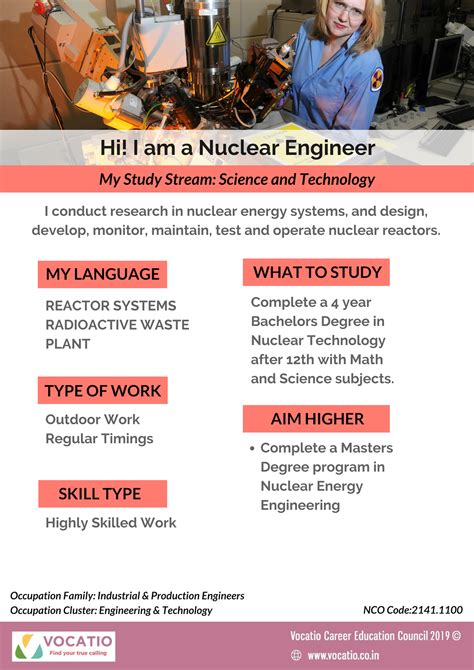
Education and Training
To become a nuclear engineer, one typically needs to possess a strong foundation in mathematics and physics, as well as a degree in nuclear engineering or a related field. The typical educational pathway for nuclear engineers includes: * Bachelor’s Degree: a four-year undergraduate degree in nuclear engineering or a related field, such as mechanical engineering, electrical engineering, or physics. * Master’s Degree: a two-year graduate degree that provides advanced training in specialized areas of nuclear engineering. * Ph.D.: a doctoral degree that prepares students for careers in research and academia. In addition to formal education, many nuclear engineers also undergo on-the-job training and continuing education to stay up-to-date with the latest technologies and industry developments.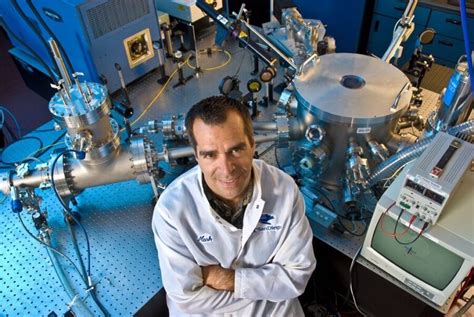
Career Paths and Job Opportunities
Nuclear engineers can pursue a wide range of career paths, from research and development to operations and management. Some of the most common job opportunities for nuclear engineers include: * Nuclear Power Plant Operator: responsible for the safe and efficient operation of nuclear power plants. * Nuclear Engineer: designs and develops nuclear systems, equipment, and processes. * Radiation Protection Specialist: develops and implements strategies to minimize radiation exposure. * Nuclear Safety Inspector: conducts inspections and audits to ensure compliance with safety regulations. * Research Scientist: conducts research and development in nuclear engineering and related fields.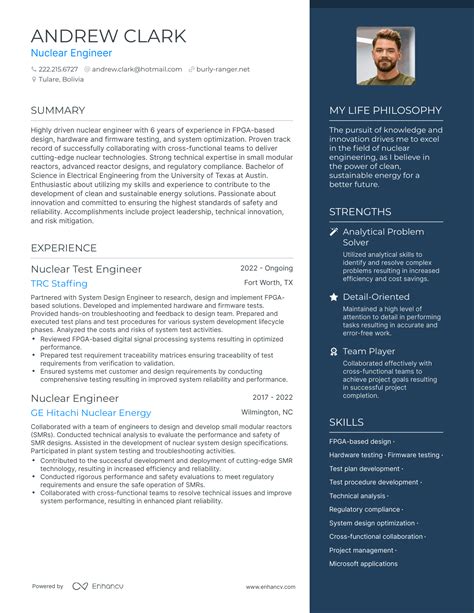
Salary and Benefits
Nuclear engineers are generally well-compensated, with median salaries ranging from 60,000 to over 150,000 per year, depending on factors such as location, experience, and industry. In addition to competitive salaries, many nuclear engineers also enjoy comprehensive benefits packages, including health insurance, retirement plans, and paid time off.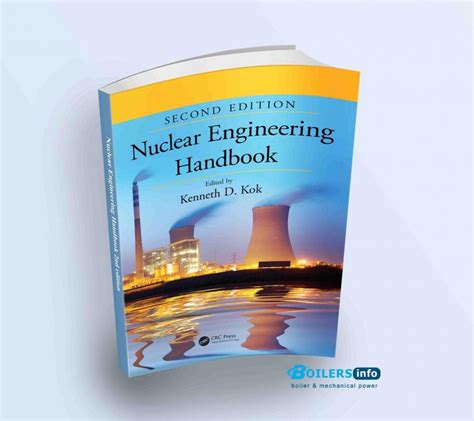
| Job Title | Median Salary |
|---|---|
| Nuclear Power Plant Operator | $70,000 - $110,000 |
| Nuclear Engineer | $80,000 - $140,000 |
| Radiation Protection Specialist | $60,000 - $100,000 |
| Nuclear Safety Inspector | $80,000 - $120,000 |
| Research Scientist | $90,000 - $150,000 |
💡 Note: Salaries may vary depending on location, experience, and industry, so these figures are only a rough guide.
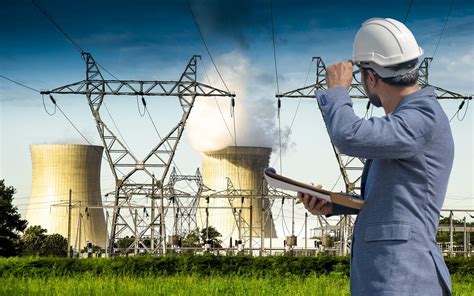
Future Outlook and Challenges
The future of nuclear engineering looks bright, with growing demand for clean and sustainable energy sources. However, the field also faces significant challenges, including: * Nuclear Waste Disposal: the safe and secure disposal of radioactive waste remains a major challenge. * Public Perception: nuclear engineering faces public skepticism and concern about safety and environmental impact. * Regulatory Frameworks: nuclear engineers must navigate complex and evolving regulatory frameworks. Despite these challenges, nuclear engineering offers a rewarding and challenging career path for those passionate about energy, science, and technology.In summary, nuclear engineering is a dynamic and exciting field that offers a wide range of career opportunities and specializations. With the right education, training, and experience, nuclear engineers can pursue rewarding careers in research, development, operations, and management, and contribute to the development of cleaner and more sustainable energy sources.
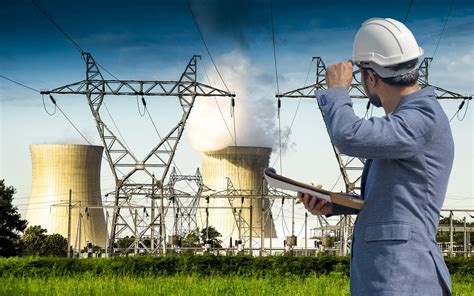
What is the average salary for a nuclear engineer?
+The average salary for a nuclear engineer can range from 60,000 to over 150,000 per year, depending on factors such as location, experience, and industry.
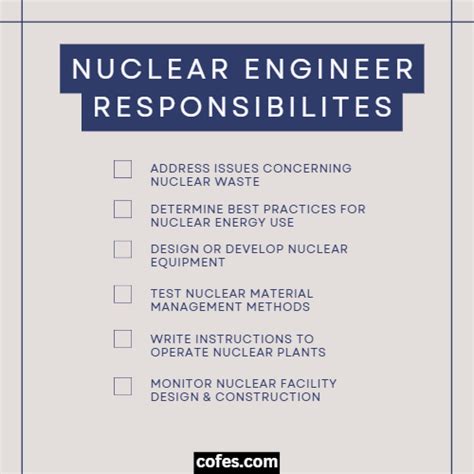
What are the most common job opportunities for nuclear engineers?
+Nuclear engineers can pursue a wide range of career paths, including nuclear power plant operator, nuclear engineer, radiation protection specialist, nuclear safety inspector, and research scientist.

What are the biggest challenges facing the nuclear engineering field?
+The nuclear engineering field faces significant challenges, including nuclear waste disposal, public perception, and regulatory frameworks. Despite these challenges, the field offers a rewarding and challenging career path for those passionate about energy, science, and technology.



